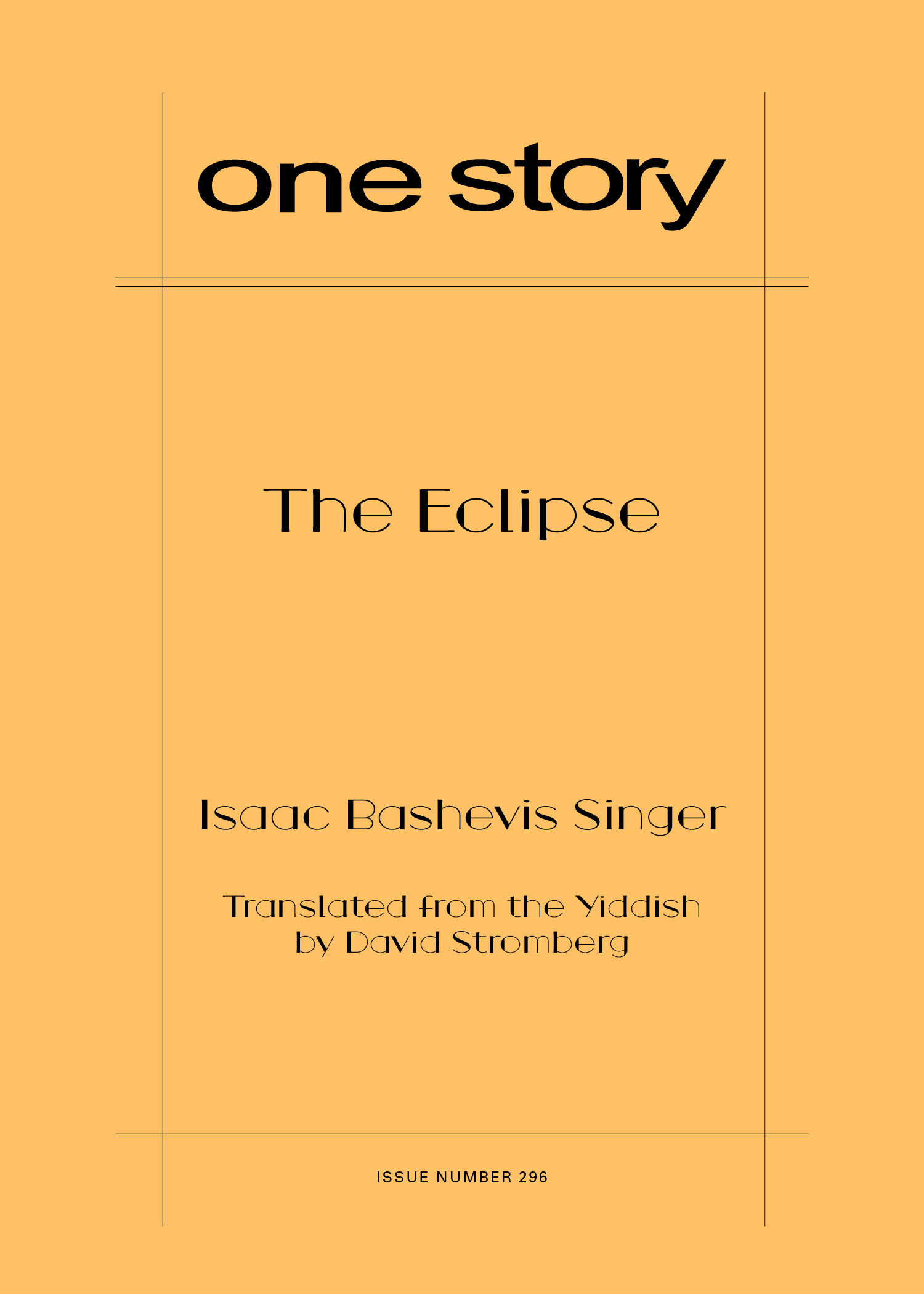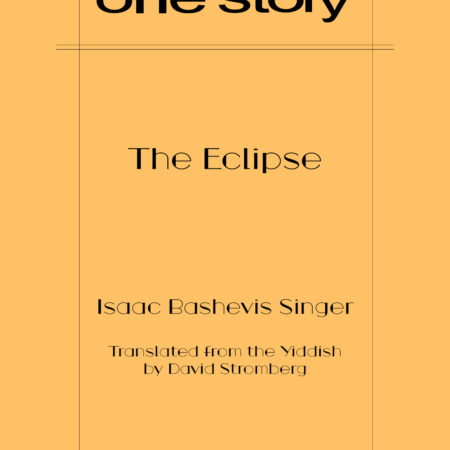
The Eclipse
$2.50
48 in stock
Excerpt
At a pub, in the dusk of late afternoon, the light from a few parchment-covered lampshades flickered in the glasses, the bottles, the bluish mirror behind the bar. It looked as if the smooth beams were trapped inside the bottles together with the liquor. On the back wall, a television set showed a boxing match between two men, one Black and one white. From another set drifted a drawn out melody full of trills and whispers—now feminine and delicate, now full of spiritual yearning, now in hysterically hoarse squeals, all with the same refrain, “My shoes…”
There was a small crowd of men and a couple of women leaning against the bar. Some had full glasses, some played with empty ones. They spoke with half-drunk irritation to each other and to the bartender—a tall man in white shirtsleeves with the mildly cautious eyes of a strongman and with the sharpened ears of someone who has to listen to everyone speaking all at once.
They spoke of a holdup in a bar nearby. The owner had pulled a gun out on the thieves, but they shot him first. Then the robbers put everyone in a back room and took off with the cash.
A small man—wearing a tattered jacket, with a pair of large worn tradesman’s hands, with a bent wrinkled neck like a chicken’s foot, and with a tuft of hair on his bald head—blamed the police.
“Where are they when you need them? Why do they only find the murderer when the victim is a young woman from Park Avenue?”
The bartender poured someone a glass of whiskey and said, “The politicians do whatever they want. They’re the bosses—not us.”
“True, true.”
Isaac Bashevis Singer
Isaac Bashevis Singer (1903-1991) was a Polish-born Jewish-American author of short stories, novels, essays, cultural criticism, memoirs, and stories for children. His career spanned nearly seven decades of literary production, at the center of which was the translation of his work from Yiddish into English, which he undertook with various collaborators and editors. Singer received numerous awards and prizes, including the Nobel Prize in Literature (1978). Known for fiction that portrayed 19th-century Polish Jewry as well as supernatural tales that combined Jewish mysticism with demonology, Singer was a master storyteller whose sights were set squarely on the tension between human nature and the human spirit. For more information about Singer and his work visit: www.bashevissinger.com.
David Stromberg (translator)
David Stromberg is a writer, translator, and scholar whose work has appeared in The American Scholar, Smart Set, and Los Angeles Review of Books, among other publications. His recent books include Old Truths and New Clichés, an edited collection of Isaac Bashevis Singer’s essays, and a speculative nonfiction novella, A Short Inquiry into the End of the World. His new essay, “The Eternal Hope of the Wandering Jew,” appears in The Hedgehog Review. See more at www.davidstromberg.com.
Hannah Tinti on “The Eclipse”
The first time I read Isaac Bashevis Singer was in high school, when we were assigned “Gimpel the Fool.” From the first paragraph, a voice appeared that was funny, sharp, and wise—clear-eyed about the failures of humankind but still full of wonder. Singer’s work has been a touchstone, so I’m especially delighted to be presenting our new issue of One Story: “The Eclipse” by Isaac Bashevis Singer, published in English for the first time in a translation by David Stromberg.
Set (and written) in the 1950s, “The Eclipse” brings us back in time to a rough and seedy New York City, where an aged and down-on-his-luck ex-gangster Joe McCloskey sits in a bar, waiting for his enemies to die. Full of rage, he sees the worst in everyone around him, but when the bar empties into the street to watch a lunar eclipse, Joe’s apathy begins to thaw as strangers are drawn together. It’s a uniquely New York City moment (one I’ve experienced myself). In a most unnatural place, nature stuns everyone back to their humanity.
In his 1978 Nobel Prize acceptance speech, Singer said, “While the poet entertains, he continues to search for eternal truths, for the essence of being. In his own fashion he tries to solve the riddle of time and change, to find an answer to suffering, to reveal love in the very abyss of cruelty and injustice.” This kind of search feels vital as things continue to collapse around the world. With “The Eclipse,” Singer shines a light from the past into our present gloom, reminding us that even in our most dispirited moments, we can still find hope and miracles.
Q&A by Hannah Tinti
- HT: When were you first introduced to Isaac Bashevis Singer’s work? And how did you first come across this untranslated story?
- DS: I first heard Singer’s name as an undergraduate at UCLA, where I majored in math but cobbled together a parallel track on art and literature. I didn’t read Singer until about a decade later, when I lived in New York. I’d always been prejudiced against his reputation as an old-time storyteller—but when I began actually to read his writing, I discovered a modern writer playing with forms of folk storytelling. As for coming across this story, I’ve been researching, translating, and writing about Singer for a little over a decade. One of the first things you discover when you work on Singer is that there’s no complete bibliography—two different people worked on what’s been published and, because of a misunderstanding, there’s a gap left between July 1952 and December 1959. I worked to fill that gap, which I haven’t had a chance to publish yet, but I discovered several stories published in that time that were labeled as “short fiction,” but that were not referenced anywhere else. My feeling was that these would be interesting to translate and to make their existence known, since they were totally off the radar for even the most knowledgeable Singer scholars. “The Eclipse” was among the stories.
- HT: When did Singer write this story? And what was his relationship with New York City?
- DS: This specific story was first published in the Yiddish daily The Forverts on May 27, 1956. By then, Singer had lived in New York for just over two decades. It was his second home, in which he had struggled to survive, first living on a tourist visa, briefly as an undocumented immigrant, and then, later, as a legal resident and eventually citizen of the United States. These experiences all bound him to his adopted home. Though many readers are familiar with Singer’s portrayal of Holocaust survivors in the city, in this story, we see that he was also interested in how other ethnic, social, and cultural groups experienced the city.
- HT: What challenges did you face while translating “The Eclipse”?
- DS: “The Eclipse” takes us out of familiar Singer territory—which is usually the Jewish experience. And its language, especially in the section describing the eclipse itself, is a lot more flowery than Singer uses in most of his works. So this took special attention to the poetry of the language and its connection to the spiritual elements that he wanted to bring out through the story. This made it especially important to get the opening paragraph just right, since it was written in a way that set the stage for everything else to come, including the change in scenery. In Yiddish, it’s written in a style that almost resembles the description of a stage set at the beginning of a play. In English, this had to be finessed somewhat, to make it flow with the rest of the narrative.
- HT: “The Eclipse” begins in a seedy bar, then lifts the gaze of the protagonist to the heavens. Why do you think Singer juxtaposed these two settings?
- DS: Singer was interested in the human experience of revelation. He even wrote a novella—a kind of mashup between science fiction and Platonic myth—called The Revelation. But he always wanted to ground these moments of spiritual opening with the difficult experiences that brought the human spirit down. Singer introduced the seediness of the bar not only because it set the right mood for the shift that would later come in the story. I think he really caught the sense that people who are down on their luck, and who are disaffected in various ways, do need a place to gather, commiserate, and maybe even feel a sense of community. Except, in “The Eclipse,” he shows how this mutual commiseration can turn, though a spiritual event, into genuine desire for human contact.
- HT: Although this story was written (and is set) in the past, Joe McCloskey’s character feels similar to many angry, disenchanted people in the world today. Do you think that Joe will be able to stick with his change of heart?
- DS: It’s hard to say. I’m not sure that even Singer had in mind one or another option. The important part, I think, is that we experience the change of heart itself alongside Joe. We, too, are like the disenchanted people in the story, and we, too, can experiences changes of heart. Whether we can stick to them is up to us.
- HT: What projects are you working on now?
- DS: I generally split my time between writing and translating. In the past few years, I’ve been writing a series of speculative essays that feature a character I call Mister Investigator—a private eye whose landscape is not a particular city or country, but literature, history, and culture at large. His first case, A Short Inquiry into the End of the World, appeared in 2021. His second case, The Eternal Hope of the Wandering Jew, came out in November. I’m now working on his third case, To Kill an Intellectual, which is about anti-intellectualism in the past, present, and possibly future… Aside from that, I’ve just started a new translation project—a three-volume collection of Singer’s cultural criticism on Yiddish culture and Jewish life. Its working title is Yiddish and Yiddishkayt and it will be published by the Yiddish Book Center’s White Goat Press. The hope is to have the first volume out around this time next year.
- HT: What’s the best bit of writing advice you’ve ever received?
- DS: Work chronologically. Don’t skip ahead and then come back to fill in earlier parts. I realize it’s not the romantic or inspirational kind of writing advice we usually seek. But twenty years after it was given to me by Peter Gadol, with whom I studied at CalArts, I can say that it’s the piece of advice to which I return most often.
- HT: Is there some additional writing advice from Isaac Bashevis Singer, or something you’ve learned from translating his work, that you could also share?
- DS: Journalism doesn’t harm other forms of writing. It teaches you how to connect with readers. For me, it also taught me to trust myself a little more when writing in less structured genres.
